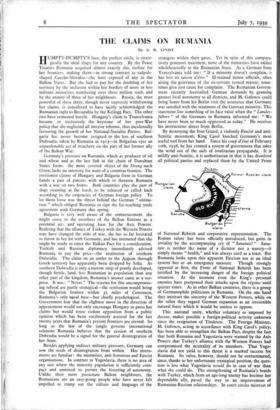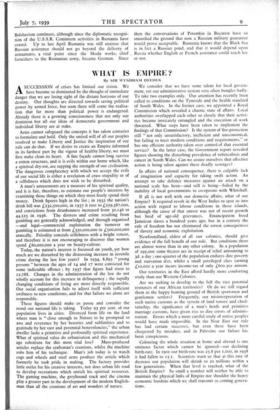THE CLAIMS ON RUMANIA
By A. R. LINDT
IIUMPTY-DUMPTY'S face, the perfect circle, is strate- gically the ideal shape for any country. By the Peace Treaties Rumania acquired almost exactly this outline for her frontiers, making them—in strong contrast to tadpole- shaped Czecho-Slovakia—the least exposed of any in the Balkan States. But she had to pay for the doubling of her territory by the inclusion within her borders of more or less militant minorities numbering over three million souls and by the enmity of three of her neighbours. Russia, the most powerful of these three, though never expressly withdrawing her claims, is considered to have tacitly acknowledged the Rumanian right to Bessarabia by the Kellogg Pact. The other two have remained hostile. Hungary's claim to Transylvania became so exclusively the keystone of her post-War policy that she neglected all interior reforms, thus incidentally favouring the growth of her National-Socialist Parties. Bul- garia has never become resigned to the loss of southern Dobrudja, taken by Rumania in 1913—in Bulgarian eyes an unpardonable act of treachery on the part of her former ally of the Balkan War.
Germany's pressure on Rumania, which as producer of oil and wheat and as the last link in the chain of Danubian States forms the most coveted object of the Drang each Osten, lacks no intensity for want of a common frontier. The revisionist claims of Hungary and Bulgaria form in German hands a pair of pincers with which to threaten Rumania with a war on two fronts. Both countries play the part of dogs straining at the leash, to be released or called back according to the exigencies of German foreign policy. To let them loose was the threat behind the German " ultima- tum " which obliged Rumania to sign the far-reaching trade agreement with Germany this spring.
Bulgaria is very well aware of the embarrassment she might cause to the members of the Balkan Entente as a potential air- and operating base for the Axis Powers. Realising that the alliance of Turkey with the Western Powers may have changed the risks of war, she has so far hesitated to throw in her lot with Germany, and has intimated that she might be ready to enter the Balkan Pact for a consideration. Turkish and Russian diplomacy immediately advised Rumania to pay the price--the restitution of southern Dobrudja. The claim on an outlet to the Aegean through Greek territory has apparently been dropped by Sofia. As southern Dobrudja is only a narrow strip of poorly developed, though fertile, land, less Rumanian in population than any other part of the kingdom, Rumania's answer came as a sur- prise. It was : " Never." The reasons for this uncompromis- ing refusal are partly strategical—the restitution would bring the Bulgarian frontier within 35 miles of Constanza, Rumania's only naval base—but chiefly psychological. The Government fear that the slightest move in the direction of appeasement would not only encourage Hungary to press her claims but would rouse violent opposition from a public opinion which has been vociferously assured for the last twenty years that Rumania's present frontiers are eternal. So long as the law of the jungle governs international relations Rumania believes that the cession of southern Dobrudja would be a signal for the general disintegration of her State.
Besides applying indirect military pressure, Germany can sow the seeds of disintegration from within. Her instru- ments are familiar: the minorities, anti-Semitism and Fascist organisations. In contrast to Yugoslavia, there is no area of any size where the minority population is sufficiently com- pact and unmixed to permit the fostering of autonomy. Unlike their more passionate Balkan neighbours, the Rumanians are an easy-going people who have never felt impelled to stamp out the culture and language of the strangers within their gates. Yet in spite of this compara- tively generous treatment, none of the minorities have rallied wholeheartedly to the Rumanian State. As a German from Transylvania told me: " If a minority doesn't complain, it has lost its raison d'être." Ill-trained minor officials, often airing the grievance of the ex-servant turned master, some- times give just cause for complaint. The Rumanian Govern- ment recently forestalled German demands by granting greater local autonomy to all districts, and M. Gafencu could bring home from his Berlin visit the assurance that Germany was satisfied with the treatment of the German minority. This statement lost something of its face value when the " Landes- fiihrer " of the Germans in Rumania informed me: " We have never been so much oppressed as today." He receives his instructions direct from Berlin.
By destroying the Iron Guard, a violently Fascist and anti- Semitic movement, King Carol knocked Germany's most useful tool from her hand. Since his coup d'etat of February loth, 1938, he has created a system of government that takes the wind out of the sails of totalitarian propaganda. It is mildly anti-Semitic, it is authoritarian in that it has dissolved all political parties and replaced them by the United Front of National Rebirth and corporative representation. The Roman salute has been officially introduced, but gains in joviality by the accompanying cry of "Sanatate! " Sana- tate is neither the name of a dictator nor a warcry—it simply means " health," and was always used as a toast. But Rumania looks upon this apparent Fascism not as an ideal system but as an emergency measure. Though strongly opposed at first, the Front of National Rebirth has been justified by the increasing danger of the foreign political situation. At the moment even the King's personal enemies have postponed their attacks upon the regime until quieter times. As in other Balkan countries, there is a group of Germanophile politicians in Rumania. On the one hand they mistrust the sincerity of the Western Powers, while on the other they regard German expansion as an irresistible natural force which it would be useless to oppose.
This national unity, whether voluntary or imposed by decree, makes possible a foreign-political activity unknown since the resignation of Titulescu. The Foreign Minister, M. Gafencu, acting in accordance with King Carol's policy, has been able to strengthen the Balkan Pact, despite the fact that both Rumania and Yugoslavia were warned by the Axis Powers that Turkey's alliance with the Western Powers had compromised the neutrality of its members. That Yugo- slavia did not yield to this threat is a marked success for Rumania. Its value, however, should not be overestimated, since, thanks to her unfortunate strategical position, the ques- tion is less what Yugoslavia would do in case of war than what she could do. The strengthening of Rumania's bonds with Turkey, which from an age-long enemy has become her dependable ally, paved the way to an improvement of Rumanian-Russian relationships. In court circles mistrust of Bolshevism continues, although since the diplomatic recogni- tion of the U.S.S.R. Comintern activities in Rumania have ceased. Up to last April Rumania was still anxious that Russian assistance should not go beyond the delivery of armaments, a vital point since the Skoda works, chief furnishers to the Rumanian army, became German. Since then the conversations of Potemkin in Bucarest have so smoothed the ground that now a Russian military guarantee would prove acceptable. Rumania knows that the Black Sea is in fact a Russian pond, and that it would depend upon Russia whether English or French assistance could reach her or not.











































 Previous page
Previous page